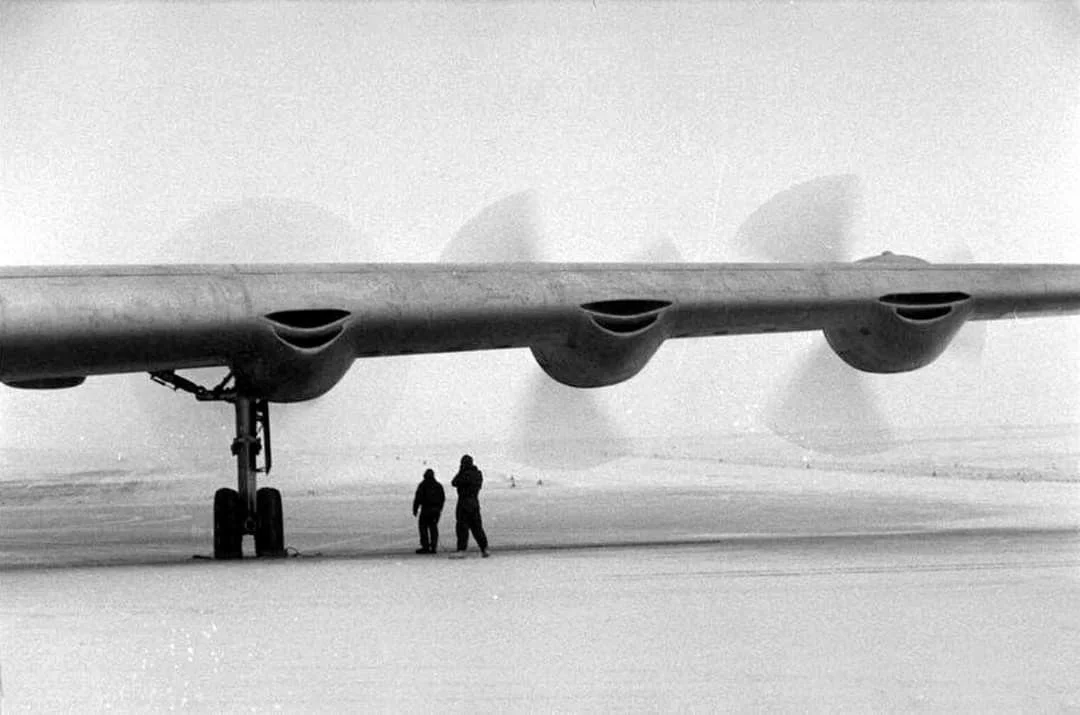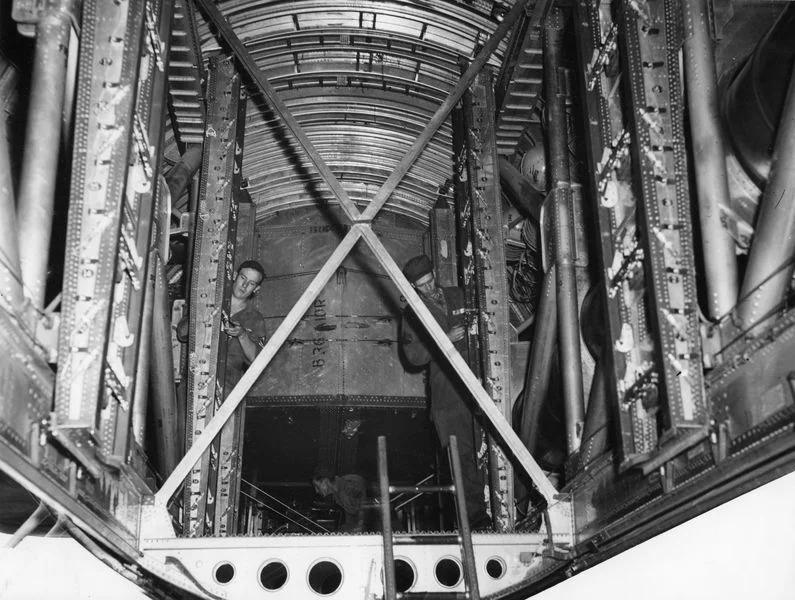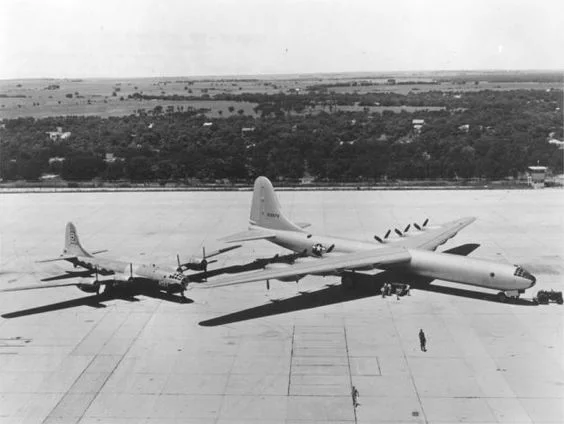
The Scale of the B-36 Peacemaker in 26 Stunning Photos
The B-36 Peacemaker is most famous for its monstrous, gargantuan, tremendous size. It is the largest mass-produced piston-engine aircraft ever, and it has the largest wing span of any military aircraft.
Designed as an intercontinental bomber, the B-36’s size wasn’t for fun, it was necessary to carry enough fuel and ordnance at high altitudes between continents without refuelling.
In this article we are going to show you just how BIG this aircraft was, in 26 images.
Background
The B-36’s is a Cold War nuclear bomber, but its development actually began before the United States had even entered the Second World War.
At this time it wasn’t guaranteed that Britain could hold the line against Germany, and may even fall under German occupation. Without the UK as a staging ground, the US would have to cross the Atlantic Ocean if it wanted to hit targets with strategic bombing.
The B-17 was the US’s primary heavy bomber in 1941, but it had no-way near enough range or grunt to carry bombs across the Atlantic, so a new bomber would be needed: an intercontinental bomber.
 This was before in-flight refueling had matured. To achieve great range, the aircraft needed to be huge.
This was before in-flight refueling had matured. To achieve great range, the aircraft needed to be huge.
The request for such a bomber came in early 1941, and it had some seriously tough requirements to meet: such as being able to cruise as fast as many fighters, and reach altitudes above the range of anti-aircraft guns all the while carrying a sufficient bomb load thousands of miles.
While the B-36 was initially needed to cross the Atlantic, the Pacific War revealed the need for a bomber with great range, for which the B-36 would be perfectly suited. Convair developed the aircraft, but it wouldn’t be ready in time for the war, being revealed just a few months after Japan surrendered in 1945.
What they revealed was a bomber of titanic proportions.
The B-36’s Massive Size
The B-36 is an aircraft that still ranks as one of the biggest ever, or even the biggest ever in some metrics, despite being designed 80 years ago.
At 166,000 lbs (75,300 kg) empty, it weighed more than twice as much as the B-29 Superfortress, and almost five times as much as the B-17 Flying Fortress.
Fully loaded, this beast weighed over 200 tons. In fact, its bomb load of 86,000 lb (39,000 kg) is more than the empty weight of the B-29 – meaning that, if it could fit, it could carry an entire B-29, or more than two B-17s in its bomb bay.
 This is arguably the best display of the B-36’s size. At the back is a B-18 Bolo, on the left is a B-29, at the front is a B-17, and on the fight is a B-36.
This is arguably the best display of the B-36’s size. At the back is a B-18 Bolo, on the left is a B-29, at the front is a B-17, and on the fight is a B-36.
The B-36 measured 162 ft (49 meters) in length, and had an enormous wingspan of 230 ft (70 meters). This is, ironically, the same width as Red Square in Moscow. It is also almost twice the length of the Wright brothers’ first flight.
Its tail was over 46 ft 10 in (14 meters) tall, equivalent to more than a 4 story building.
Those giant wings allowed the aircraft to fly at impressive heights of over 40,000 ft. At these heights the B-36 was more manoeuvrable than any interreceptor sent to bring it down. Some units were lightened, giving them a rumoured maximum altitude of over 50,000 ft!
 B-36 Peacemaker’s giant bomb bay. It was the first US bomber able to carry all nuclear weapons in the US arsenal as standard.
B-36 Peacemaker’s giant bomb bay. It was the first US bomber able to carry all nuclear weapons in the US arsenal as standard.
Powering this behemoth was six Pratt & Whitney R-4360 Wasp Major radial engines. Each engine had 28 cylinders, displaced 4,362.5 cu in (71.5 litres) and produced almost 4,000 hp. The R-4360s were the largest and most powerful piston aircraft engines built by the US.
Each engine had 56 spark plugs, for a total across all six engines of 336 spark plugs. The engines drove 19 ft (5.8 meter) propellers, some of largest ever built. 1,200 gallons of oil kept the engines running. Its wings were so big that the engines could be accessed in-flight.
To keep the B-36 flying great distances, it carried 40,000 gallons of fuel – enough to power a modern petrol car for over 1.4 million miles!
 Crews working on the huge engines.
Crews working on the huge engines.
Gallery
 The enormous 110-inch wheel of the XB-36. These were later swapped with four smaller wheels.
The enormous 110-inch wheel of the XB-36. These were later swapped with four smaller wheels.
 Maintenance crew working inside the cavernous main landing gear-well.
Maintenance crew working inside the cavernous main landing gear-well.
 A maintenance crew’s legs hang out the huge engine air intake.
A maintenance crew’s legs hang out the huge engine air intake.
 RB-36s in Convair’s aircraft plant, 1951.
RB-36s in Convair’s aircraft plant, 1951.
![]() Republic GRF-84F suspended under a B-36 during the FICON (FIghter CONveyer) project.
Republic GRF-84F suspended under a B-36 during the FICON (FIghter CONveyer) project.
 Crews and vehicles all under the B-36’s huge footprint.
Crews and vehicles all under the B-36’s huge footprint. Three crew fit quite comfortably in this air intake to talk to a woman below this B-36.
Three crew fit quite comfortably in this air intake to talk to a woman below this B-36.
 The bombardier’s position inside the nose of a B-36.
The bombardier’s position inside the nose of a B-36.
 The massive 19-foot propellers on the trailing edge of the B-36’s wings.
The massive 19-foot propellers on the trailing edge of the B-36’s wings.
 An XF-92 prototype is dwarfed by just the nose of the B-36 Peacemaker.
An XF-92 prototype is dwarfed by just the nose of the B-36 Peacemaker.
 22-man crew of the RB-36.
22-man crew of the RB-36.
 The area of the wings is simply staggering.
The area of the wings is simply staggering.
 110 inch Goodrich tyre.
110 inch Goodrich tyre.
 A B-58 Hustler next to a B-36.
A B-58 Hustler next to a B-36.
 A mechanic hangs off the main landing gear strut of a B-36.
A mechanic hangs off the main landing gear strut of a B-36.
 An RB-36 (reconnaissance version) leaves its distinct six vapor trails.
An RB-36 (reconnaissance version) leaves its distinct six vapor trails.
 B-36 next to a B-29.
B-36 next to a B-29.
 This tunnel inside the B-36 allowed the crew to pass the non-pressurized bomb bays while moving through the aircraft.
This tunnel inside the B-36 allowed the crew to pass the non-pressurized bomb bays while moving through the aircraft.
 Crews look tiny on top oft the wings of this huge aircraft.
Crews look tiny on top oft the wings of this huge aircraft.
 Ground crew stand below three running engines.
Ground crew stand below three running engines.
 The last B-36 to come off Convair’s production line.
The last B-36 to come off Convair’s production line.
One of the B-36’s enormous 28-cylinder engines starting up.
News
The Hanging Temple: China’s 1,500-Year-Old Cliffside Marvel of Faith and Engineering
The Hanging Temple: China’s 1,500-Year-Old Cliffside Marvel of Faith and Engineering Perched precariously on the cliffs of Mount Heng in Shanxi Province, China, the Hanging Temple, also known as Xuankong Temple, Hengshan Hanging Temple, or Hanging Monastery, is an architectural…
The Willendorf Venus: A 30,000-Year-Old Masterpiece Reveals Astonishing Secrets
The Willendorf Venus: A 30,000-Year-Old Masterpiece Reveals Astonishing Secrets The “Willendorf Venus” stands as one of the most revered archaeological treasures from the Upper Paleolithic era. Discovered in 1908 by scientist Johann Veran near Willendorf, Austria, this small yet profound…
Unveiling the Maya: Hallucinogens and Rituals Beneath the Yucatán Ball Courts
Unveiling the Maya: Hallucinogens and Rituals Beneath the Yucatán Ball Courts New archaeological research has uncovered intriguing insights into the ritual practices of the ancient Maya civilization. The focus of this study is a ceremonial offering found beneath the sediment…
Uncovering the Oldest Agricultural Machine: The Threshing Sledge’s Neolithic Origins
Uncovering the Oldest Agricultural Machine: The Threshing Sledge’s Neolithic Origins The history of agricultural innovation is a fascinating journey that spans thousands of years, and one of the earliest known agricultural machines is the threshing sledge. Recently, a groundbreaking study…
Nara’s Ancient Sword: A 1,600-Year-Old Protector Against Evil Spirits
Nara’s Ancient Sword: A 1,600-Year-Old Protector Against Evil Spirits In a remarkable discovery that has captured the attention of archaeologists and historians alike, a 7.5-foot-long iron sword was unearthed from a 1,600-year-old burial mound in Nara, Japan. This oversized weapon,…
The Inflatable Plane, Dropped Behind the Lines for Downed Pilots
Experimental The Inflatable Plane, Dropped Behind the Lines for Downed Pilots The Inflatoplane from Goodyear was an unconventional aircraft developed by the Goodyear Aircraft Company, a branch of the renowned Goodyear Tire and Rubber Company, also famed for the Goodyear…
End of content
No more pages to load











